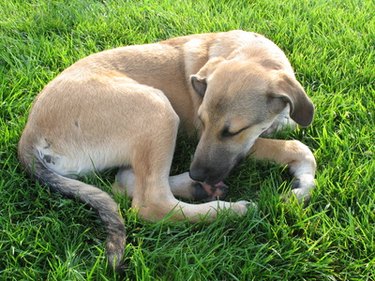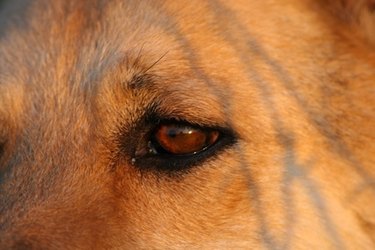Albon (sulfadimethoxine) is an antibiotic approved by the U.S. Food & Drug Administration for use in dogs and cats. It is commonly used to treat bacterial infections, such as coccidiosis in dogs, an inflammation and parasitic infection in the small intestine caused by excessive coccidia protozoa. A veterinarian may prescribe Albon tablets or a liquid oral suspension. Like most medications, Albon can have certain side effects that a dog and their owner may find undesirable.

Video of the Day
Albon side effects for dogs can include allergies
As with any medication, there is a chance your dog could be allergic to Albon. Signs of an allergic reaction include itchy skin, coughing, sneezing, wheezing, and discharge from the nose or eyes. In extreme cases, the medication could cause an anaphylactic response, which can be life-threatening. Always monitor your dog for signs of allergic reaction when administering a new medication.
Video of the Day

Polyarthritis in a dog's joints
Polyarthritis is a rare but serious side effect of Albon. It's a type of immune-mediated arthritic inflammation that causes pain and swelling in multiple joints.
Common symptoms of polyarthritis include fever, swollen joints, lethargy, and lameness. When left untreated, it can erode the tissue in a dog's joints, causing pain and lameness. However, polyarthritis can be treated or managed with medications.
Albon may affect a dog's blood health
Though it's a less common side effect, Albon may affect a dog's blood health in two ways: anemia and blood loss. An anemic dog may have lower stamina or may become lethargic or listless. One of the most common signs of anemia is pale gums.
In dogs who suffer from Von Willebrand's disease, Albon may affect the dog's ability to produce blood platelets or may prevent platelets from functioning properly. Blood platelets are particles found within a dog's blood that enable it to clot; without them, dogs are prone to bleeding. When platelets are compromised, a dog may experience spontaneous blood hemorrhages.
Depending on the severity of either of these conditions, a dog may be treated with an emergency blood transfusion.
Digestive side effects of Albon for dogs
Vomiting and diarrhea are both common side effects of antibiotics. A dog taking Albon may experience either of these symptoms along with a loss of appetite. Bouts of vomiting or diarrhea can cause dehydration, so always ensure your dog has access to clean water to rehydrate.
If your dog has blood in their stool or experiences vomiting or diarrhea that persists for several hours, contact your veterinarian for guidance.
Albon may cause keratoconjunctivitis in dogs

Keratoconjunctivitis, also known as KCS or dry eye, might appear in a dog on Albon for an extended period, though it is usually an uncommon side effect. However, in breeds that are inherently more prone to KCS, like cocker spaniels, even a routine course of Albon can result in a pet developing permanent KCS. Signs of KCS may include redness, swelling, squinting, and a yellow discharge. This condition can often be treated with eye drops.
Sulfa crystal formation in a dog
The use of Albon for coccidia may cause sulfa crystals to form in a dog's urinary tract. Often, urine crystals pass undetected, which is the case with sulfa crystals in dogs. But in humans, some kidney stones have been associated with sulfa antibiotics.
In summary
Albon is an antibiotic medication that is commonly prescribed to treat coccidosis in dogs. While generally safe, it's wise to be aware of the potential Albon side effects so you can seek assistance if your dog is affected. Albon should be avoided in dogs with preexisting kidney or liver disease and in dogs who are pregnant or nursing. Make sure your dog has free access to fresh water at all times, particularly while taking Albon.